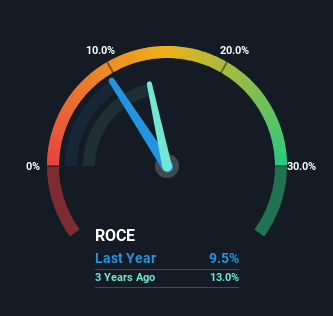- United Kingdom
- /
- Consumer Durables
- /
- LSE:BKG
Here's What's Concerning About Berkeley Group Holdings' (LON:BKG) Returns On Capital
Finding a business that has the potential to grow substantially is not easy, but it is possible if we look at a few key financial metrics. In a perfect world, we'd like to see a company investing more capital into its business and ideally the returns earned from that capital are also increasing. Put simply, these types of businesses are compounding machines, meaning they are continually reinvesting their earnings at ever-higher rates of return. Having said that, from a first glance at Berkeley Group Holdings (LON:BKG) we aren't jumping out of our chairs at how returns are trending, but let's have a deeper look.
Understanding Return On Capital Employed (ROCE)
If you haven't worked with ROCE before, it measures the 'return' (pre-tax profit) a company generates from capital employed in its business. To calculate this metric for Berkeley Group Holdings, this is the formula:
Return on Capital Employed = Earnings Before Interest and Tax (EBIT) ÷ (Total Assets - Current Liabilities)
0.095 = UK£480m ÷ (UK£7.0b - UK£1.9b) (Based on the trailing twelve months to April 2024).
Therefore, Berkeley Group Holdings has an ROCE of 9.5%. On its own that's a low return on capital but it's in line with the industry's average returns of 9.5%.
View our latest analysis for Berkeley Group Holdings

Above you can see how the current ROCE for Berkeley Group Holdings compares to its prior returns on capital, but there's only so much you can tell from the past. If you're interested, you can view the analysts predictions in our free analyst report for Berkeley Group Holdings .
What Can We Tell From Berkeley Group Holdings' ROCE Trend?
On the surface, the trend of ROCE at Berkeley Group Holdings doesn't inspire confidence. To be more specific, ROCE has fallen from 23% over the last five years. However it looks like Berkeley Group Holdings might be reinvesting for long term growth because while capital employed has increased, the company's sales haven't changed much in the last 12 months. It may take some time before the company starts to see any change in earnings from these investments.
The Bottom Line
In summary, Berkeley Group Holdings is reinvesting funds back into the business for growth but unfortunately it looks like sales haven't increased much just yet. And with the stock having returned a mere 16% in the last five years to shareholders, you could argue that they're aware of these lackluster trends. As a result, if you're hunting for a multi-bagger, we think you'd have more luck elsewhere.
One final note, you should learn about the 2 warning signs we've spotted with Berkeley Group Holdings (including 1 which is a bit unpleasant) .
While Berkeley Group Holdings may not currently earn the highest returns, we've compiled a list of companies that currently earn more than 25% return on equity. Check out this free list here.
Valuation is complex, but we're here to simplify it.
Discover if Berkeley Group Holdings might be undervalued or overvalued with our detailed analysis, featuring fair value estimates, potential risks, dividends, insider trades, and its financial condition.
Access Free AnalysisHave feedback on this article? Concerned about the content? Get in touch with us directly. Alternatively, email editorial-team (at) simplywallst.com.
This article by Simply Wall St is general in nature. We provide commentary based on historical data and analyst forecasts only using an unbiased methodology and our articles are not intended to be financial advice. It does not constitute a recommendation to buy or sell any stock, and does not take account of your objectives, or your financial situation. We aim to bring you long-term focused analysis driven by fundamental data. Note that our analysis may not factor in the latest price-sensitive company announcements or qualitative material. Simply Wall St has no position in any stocks mentioned.
About LSE:BKG
Berkeley Group Holdings
The Berkeley Group Holdings plc, together with its subsidiaries, builds homes and neighbourhoods in the United Kingdom.
Excellent balance sheet and fair value.
Similar Companies
Market Insights
Community Narratives


Recently Updated Narratives

Proximus: The State-Backed Backup Plan with 7% Gross Yield and 15% Currency Upside.

CEO: We are winners in the long term in the AI world

Early mover in a fast growing industry. Likely to experience share price volatility as they scale
Popular Narratives


MicroVision will explode future revenue by 380.37% with a vision towards success


The company that turned a verb into a global necessity and basically runs the modern internet, digital ads, smartphones, maps, and AI.



